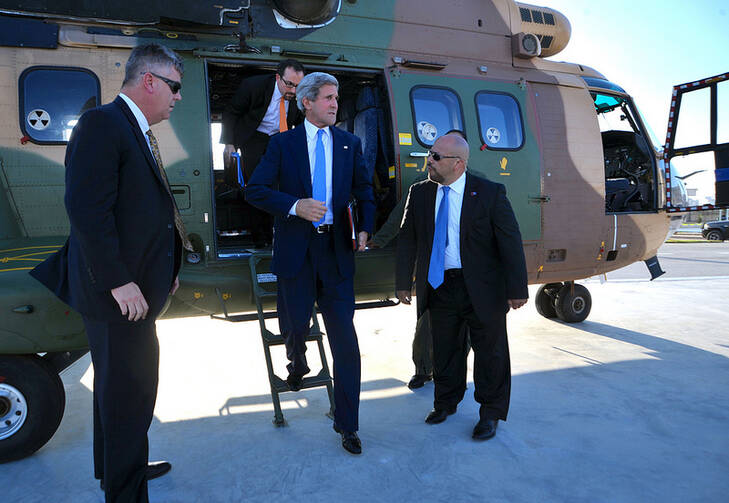In a July 26 letter to Secretary of State John Kerry, 30 Jewish, Christian and Muslim religious leaders, including three Catholic bishops, voiced “strong support for his determined initiative for Israeli-Palestinian peace.” In letters to the leadership of the Senate Foreign Relations Committee and the House Foreign Affairs Committee, the leaders called on Congress “to support Secretary Kerry’s continuing urgent efforts for peace.”
The religious leaders warmly welcomed Secretary Kerry’s announcement of an agreement “that establishes the basis for resuming direct final status negotiations between the Palestinians and the Israelis.” They noted the progress of earlier formal and informal negotiations, saying “while these talks have yet to yield a blueprint for peace, they have identified ideas for addressing key issues that must be resolved in a manner acceptable to both sides.”
After his sixth Middle East shuttle, Secretary of State Kerry announced the imminent resumption of Israeli-Palestinian peace talks in Washington. His announcement, according to State Department analysts, appeared deliberately short on details and the precise nature of the discussion was not clear: were they merely "talks" or formal negotiation? Some observers suggested that the ambiguity may have been intended to allow both parties to return to the the negotiating table without seeming to preemptively surrender any negotiating positions to the other side.
The Jewish, Christian and Muslim leaders from the National Interreligious Leadership Initiative for Peace in the Middle East offered their prayers for Secretary Kerry’s efforts and pledged that they “are prepared through the national organizations we represent to activate members of synagogues, churches and mosques across the country to support bold American leadership for peace."
Noting that years of off-and-on negotiation has led to "intermittent progress toward resolving final status issues," and if not a blueprint for peace, they have at least "identified ideas for addressing key issues that must be resolved in a manner acceptable to both sides."
The leaders added, “We know the path to peace is complex and challenging, but peace is possible.”
Catholic signers were Cardinal Theodore McCarrick, retired archbishop of Washington and a founding member of the National Interreligious Leadership Initiative for Peace in the Middle East; Bishop Richard E. Pates of Des Moines, Iowa, chairman of the U.S. bishops’ Committee on International Justice and Peace; and Bishop Denis J. Madden, auxiliary bishop of Baltimore and chairman of the U.S. bishops’ Committee on Ecumenical and Interreligious Affairs.








